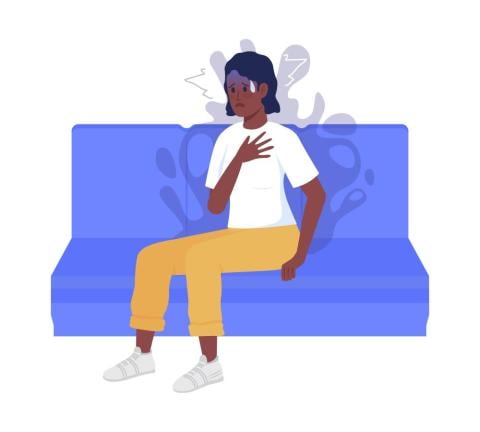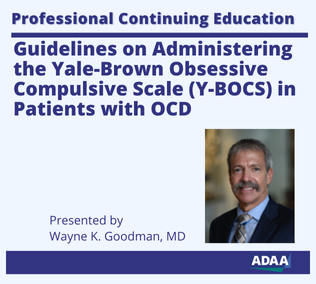Trusting Yourself Amongst Pedophilic Obsessions
Trusting Yourself Amongst Pedophilic Obsessions

Obsessive Compulsive Disorder is often misunderstood in our shared culture. Some people think of people with OCD as someone risky, potentially dangerous, or as someone with quirky personality traits (i.e. likes to clean, washes their hands often, is rigid in the arrangement of belongings). These falsehoods and stereotypes are damaging and harmful to those suffering with debilitating fears and symptoms. Some lesser known OCD themes include harm, pedophilia, and sexual obsessions. The presence of shame and stigma are a heavy reality and obstacle to treatment in those who experience OCD, especially with themes of a taboo nature.
Harm, pedophilia, sexual obsessions need more advocacy and representation to increase public understanding, reduce misdiagnosis, and to encourage sufferers to seek support such as effective treatments like ACT, ERP, and I-CBT. Obsessions are recurrent thoughts, images, sensations, sounds that cause distress. Compulsions are repetitive mental and physical behaviors aimed to prevent feared outcomes and/or alleviate distress caused by obsessions. Pedophile-OCD (P-OCD) is an obsessional theme that describes the fear of becoming a pedophile, showing up as upsetting thoughts, images, and body sensations1. Having an unwanted body response, such as arousal or sensation in the groin area, as a result of obsessions are not evidence of pedophilic disorder.2 Compulsions with P-OCD often include avoidance of anything that may trigger the distressing content, checking, excessive body-scanning, mental rituals, researching, rumination, reassurance, safety behaviors and self-punishment.3 Compulsions and avoidance can feel to the sufferer like the responsible thing to do for both others and oneself.
A person’s values are often a target of OCD. People who are susceptible to P-OCD are people who deeply care about children, have a desire to be good, have a vulnerability to doubting their true identities or self-concept, people who are easily enticed by the imagination and can over-invest in remote possibilities.4
One essential difference between P-OCD and Pedophilic Disorder is that people with OCD are in the category of ego-dystonic, meaning thoughts do not align with values, beliefs, and worldview.5 The fact that symptoms (thoughts, images, sensations) cause distress, are unwanted, and go against the person’s value system are all important factors in what makes OCD ego-dystonic.
What makes someone a pedophile is someone who has sexual desire and preference for prepubescent children, and/or someone who has engaged in child sexual abuse.6 Someone reading this with OCD might think, “Well, how do I know these thoughts, images, and sensations are unwanted? How do I know for sure this causes me genuine distress? How can I tell what my true desires or intentions are?” First, know that having thoughts, images, sensations alone are not evidence of pedophilia. Needing a “for sure” answer is also an indicator of anxiety and intolerance of uncertainty. Doubting diagnosis is a common experience in OCD sufferers. The brain will look for ways to continue to confirm your worst fears are correct, because the feared consequence is likely too upsetting to risk, even if lacking in reasonable evidence. The fact that you’re worried about it, indicates the desire isn’t true. If it was truly your sexual preference, it would feel like other things you “know” about yourself: like when you know you need to yawn, or need to drink water, or when you know you like a piece of art, or enjoy a song. Real pedophiles don’t doubt their sexual desire for children, and they act on it.
Second, the concepts of “inner sense” data and “reality sensing” from Inference-Based CBT emphasize the 5 senses, including common sense, existing knowledge, observation, intention and desire, which can be used to restore confidence in your true self and self-trust. I-CBT posits the self-narrative and faulty reasoning process as reinforcing a person's obsessional doubts, and subsequent anxiety and compulsions. Inner sense data and reality sensing can help provide clarity on the true self, even when doubts arise. You likely are not questioning your desire and intentions in other ways in your life, ways that don’t involve the fear of being a pedophile. Such as when you crave a slice of pizza, or have the need to sneeze, or the instinctive urge to hold the door open for the person behind you, or times when you did feel genuine sexual desire appropriately (liked it and wanted to!). When OCD isn’t so loud, you are using your senses, trusting your intentions, including desires and preferences, effortlessly. It’s the self-story and faulty reasoning that confuses your reality and creates distrust. Reality sensing is about using information from the senses to tell you about reality in the present moment, and encourages acting upon the knowledge that the feared version of you is false (in this case, being a pedophile).7
In P-OCD, over-thinking is often one of the main compulsions: also known as rumination. Resisting “figuring out” if you are a pedophile is a very challenging practice. Rumination-Focused ERP frames the mental labor and energy of thinking about worry as a main source of anxiety.8 This means you can learn to choose when to respond and engage with thoughts, feelings and sensations that are troubling. When you stop trying to answer every thought, feeling, and sensation you can refocus your energy and time into doing more values-based living, which actually might give you some relief.
Lastly, it’s important to know that there is no obsession, thought, feeling, image or sensation out there that would make you untreatable or unworthy of support. Recovery is possible and there’s more hope than ever in the community as there is more than one evidence-based treatment available for OCD sufferers.
Here are some tips for practicing trusting yourself in the presence of obsessions:
- Acknowledge and label thoughts when they occur, without attachment and judgment.9
- “Give up” trying to answer or problem-solve obsessional content.10
- Identify ways in which you don’t second guess or doubt your intentions and desires.11
- Re-orient to “here and now” reality, look to your senses for “evidence” in the present using your senses, resist answering with information the “imagination”.12
- Speak to yourself and treat yourself with the same care and respect as you would a friend in order to tolerate the suffering that symptoms cause.13
- Live your life anyway: if you weren’t worried about trusting yourself, what would you be doing? Do that!14
Questions to ask yourself:
- In what ways do I trust myself, outside of the particular worry I have?
- Do my actions, or avoidance behaviors, bring me closer to my values or the life I want for myself?
- Do my actions, including avoidance, actually keep me/others “safe”, or do these behaviors confirm the fear that I have about myself?
- Is there an imbalance in the way you are living your values because of your obsessions (over-emphasizing the value of “safety” to the neglect of the other parts of your life that are important to you i.e. “health, family, fun, love, adventure, peace”)?
Recommended Reading:
Overcoming Unwanted Intrusive Thoughts: A CBT-Based Guide to Getting Over Frightening, Obsessive or Disturbing Thoughts (Sally M. Winston & Martin N. Seif, 2019)
Resolving OCD: How To Overcome Your Obsessions With The Inference-Based Approach (Frederick Aardema, anticipated 2024)
Sexual Obsessions in OCD: A Step by Step, Definitive Guide to Understanding Diagnosis, and Treatment (Monica T. Williams & Chad T. Wetterneck, 2019)
The Intrusive Thoughts Toolkit: Quick Relief for Obsessive and Unwanted or Disturbing Thoughts (Hershfield et al., 2022)
The Self-Compassion Workbook For OCD: Lean Into Your Fear, Manage Difficult Emotions, And Focus On Recovery (Kimberely Quinlan, 2021)
This post is presented in collaboration with ADAA's OCD and Related Disorders SIG. Learn more about the SIG.





















